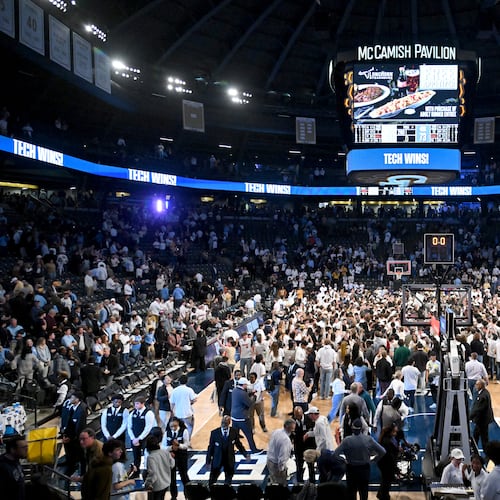Through conversations with health experts, officials at ACC schools and college athletics leaders nationwide, ACC commissioner John Swofford has learned enough to assert that he expects football to be played this fall.
At the same time, on a video conference call with media on Thursday, Swofford also acknowledged that the league is preparing for a scenario in which no sports are played at all for the entire academic year. Not surprisingly, Swofford also noted that, with the uncertainty of how COVID-19 will continue to impact sports, higher education and American society in general, he didn’t have many answers to questions about how college athletics will proceed in the year ahead.
“Intercollegiate athletics has never been in a more challenging situation than it is right now in trying to deal with that,” Swofford said. “But you can say that about so many aspects of our country.”
For those eager for the return of sports, perhaps the most encouraging piece of information that he shared was the following:
“I would emphasize that we are going into this year with the anticipation of playing at this point in time,” he said.
Swofford also said that “our institutions have indicated that they intend to open in various fashions as we go into the fall, but there’s a lot that can happen between now and then. But I think you’ll find us athletically moving forward to try and be ready in every way, shape and form to open the fall sports season.”
Georgia Tech’s statement to the AJC on its plans: “Georgia Tech, like all 26 University System of Georgia institutions, is developing a complex, comprehensive plan to resume face-to-face instruction this fall that will ensure the healthy and safety of students, faculty and staff. The details of those plans will be communicated to our stakeholders this summer.”
While optimistic, Swofford said that the conference also has plans for three other scenarios besides the one he described as “close to normal” – an abbreviated football season, an academic year with no football but with basketball and a year with no sports at all.
“Which I certainly do not anticipate happening,” he said of the final scenario, “but you do have to look at the extremes under the circumstances we’re looking at.”
Swofford also acknowledged the possibility that not all of the league’s teams may start at the same time – “We are in 10 different states, and states have a great deal to say whether games can be played and under what circumstances” – and that it’s conceivable that some of the member schools may not be able to compete at all.
Swofford said that he didn’t know the minimum number of teams needed in order to have a season, but that that discussion will be had in due time.
“But I don’t think some schools not being able to compete necessarily keeps a majority of the schools who could compete from competing,” he said.
Along the same lines, Swofford said that the possibility of teams playing only conference games instead of a full 12-game schedule is “to be determined.” For Tech, a schedule of only ACC games would mean the loss of games against Notre Dame and Georgia. Tech and Georgia have played annually since the series was suspended 1917-24.
Swofford didn’t rule out the possibility of athletes returning to campus and playing football without other students joining them, but did say “most people I talk to in college athletics and higher education, I think, agree that that’s a foreign thought to most of us.”
Other matters, like a league-wide testing protocol, a planned response for a team or staff member being diagnosed with COVID-19 and the league’s strategy for a potential second wave of infections, are also undetermined. Swofford did acknowledge that “testing is going to be critical” to allow athletes to return to campus, train and compete. He also said that a uniform testing policy would provide “a great deal of comfort” and is a goal.
Swofford also announced the formation of a COVID-19 medical advisory group that will provide guidance to the league and member schools on such matters. It includes representatives from each of the league’s schools, including Tech senior associate athletic director and chief medical officer Angelo Galante.
Swofford also said that he and other power-conference officials had a call last week with NFL commissioner Roger Goodell and other league officials to gain insight into their strategies for testing and other coronavirus matters, such as plans for allowing fans in stadiums.
Swofford said that “as we get into June and July, things will probably be more evident.” But until then, firm answers figure to be scarce.
“Life is often about Plan B,” he said. “So if Plan A doesn’t work, you go to Plan B. Well, we’re going to have to be ready for a Plan C and a Plan D. That’s a lot of the work that we’re doing at this point.”
About the Author
Keep Reading
The Latest
Featured


